The Kubota B3350 tractor is recognized for its strength and versatility on the field, offering reliable performance for various agricultural tasks. Its 38hp engine is designed to power through tasks with efficiency, making it a popular choice among farmers and property owners. However, like all mechanical equipment, the Kubota B3350 is not without its problems. Understanding these issues can be key to ensuring the longevity and productivity of your tractor.
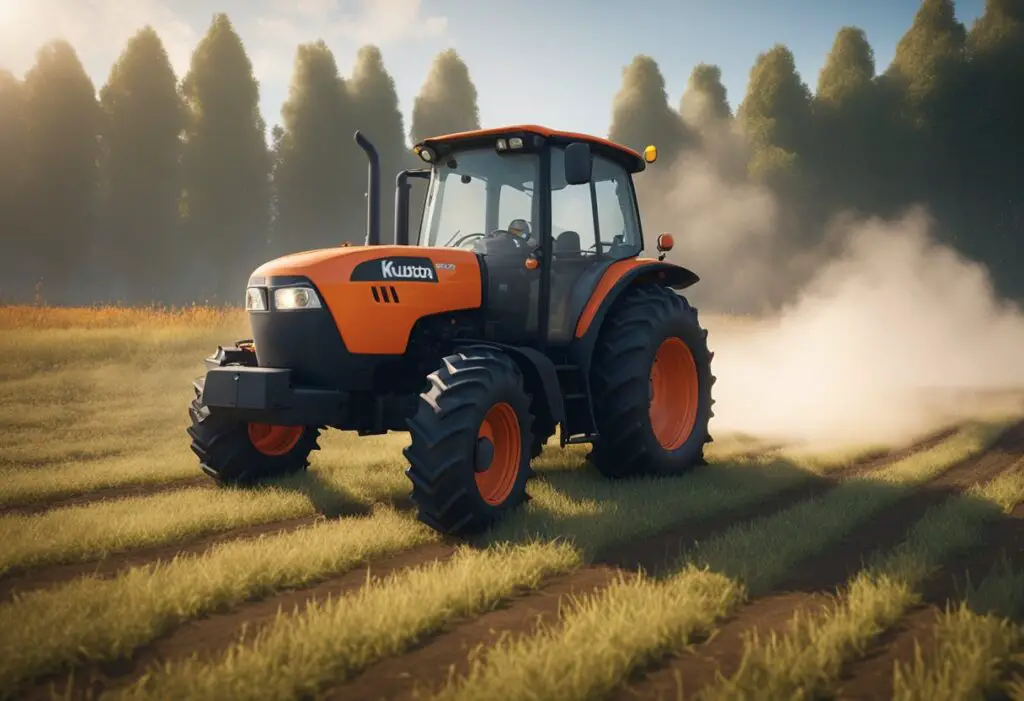
From engine and electrical difficulties to the intricate regeneration system, there are a number of common issues that owners may encounter. Regular maintenance is crucial to preventing some of these problems, but even with diligent care, some complications can still arise. Knowing how to identify and troubleshoot these issues can save you time and money, and keep your Kubota B3350 operating at its best.
Key Takeaways
- Regular maintenance can mitigate many common problems with the Kubota B3350.
- Understanding the regeneration system is essential for optimal operation.
- Becoming familiar with troubleshooting methods enhances tractor longevity.
Kubota B3350 Overview
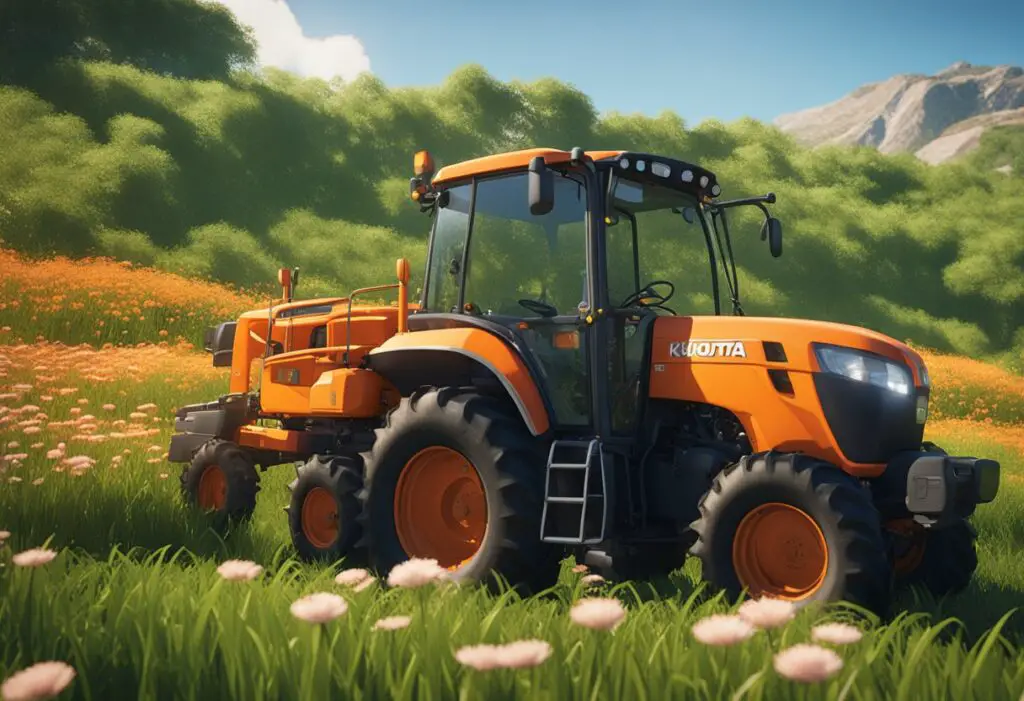
You’re considering the Kubota B3350, a compact utility tractor known for its reliability and power. Here’s an insight into its specs, features, and the B Series lineage.
Tractor Specifications
- Engine Power: You’re looking at a robust 33 horsepower engine.
- Cylinders: It’s equipped with a three-cylinder diesel engine.
- PTO (Power Take-Off): It provides a PTO power output that’s enough for various attachments.
- Hydraulics: The B3350 comes with a responsive hydraulic system for efficiency.
Here’s a look in detail:
| Specification | Detail |
|---|---|
| Engine Power | 33 HP |
| Cylinders | 3-cylinder diesel |
| PTO Power | Ample for diverse attachments |
| Hydraulics | Capable and efficient |
Compact Utility Tractor Features
Your Kubota B3350 is designed to handle a variety of tasks with ease:
- Maneuverability: Its compact size makes it perfect for navigating through tight spaces.
- Versatility: Attachments are easily swapped out, enhancing the tractor’s range of use.
- Comfort: The B3350 prioritizes your comfort with an ergonomic operator station.
B Series Lineage
- Evolution: The B Series Kubota tractors are part of a long-standing tradition of quality and dependability.
- Reputation: Known for durability, the B Series, including your Kubota B3350, is a testament to Kubota’s commitment to excellence in compact utility tractors.
Common Issues and Troubleshooting
When working with your Kubota B3350 tractor, you might encounter a range of problems that can affect its performance. This section will guide you through identifying and troubleshooting some common issues, ensuring your tractor runs smoothly.
Starting Issues
If you’re facing difficulty starting your Kubota B3350, check the battery first, as a weak battery is a frequent culprit. Additionally, a faulty starter motor or fuel system issues can also prevent the tractor from starting. Follow these steps to address the issue:
- Check the battery: Ensure it’s fully charged and has no corrosion.
- Examine the starter motor: Look for signs of wear or damage.
- Inspect the fuel system: Replace any clogged filters and ensure the fuel is fresh.
Engine Performance Problems
Your B3350 may exhibit reduced power or irregular operation due to various engine-related issues. To troubleshoot these engine problems:
- Look for oil leaks: Identifying and sealing any leak points can help.
- Address poor fuel economy: This may involve cleaning or replacing fuel injectors.
- Examine the air filters: Dirty filters can suffocate the engine, so clean or replace as necessary.
Electrical System Faults
Electrical issues in the Kubota B3350 often stem from battery problems or wiring faults. To fix electrical problems:
- Battery maintenance: Regularly check the battery’s condition, especially after long periods of inactivity.
- Wiring inspection: Look for and repair any damaged or corroded wires.
Transmission and Hydraulic System Troubles
Transmission and hydraulic systems are vital for smooth operation. Common signs of problems include jumping gears or poor hydraulic response. Here’s what you can do:
- Check hydraulic fluid: Ensure it’s at the correct level and not contaminated.
- Inspect the transmission: Make sure the gearshift is properly engaged and there’s no excessive wear.
Subpar Mowing and Tilling Experiences
If you’re unsatisfied with the mowing or tilling performance of your B3350, consider these factors:
- Blade sharpness: Dull blades result in poor cut quality, sharpen or replace them as needed.
- Tiller tines: Check for damage or wear, replacing tines if they’re no longer effective.
By following these troubleshooting tips, you can deal with most common Kubota B3350 problems and keep your tractor in top working condition.
Engine Concerns
Your Kubota B3350 may encounter various engine issues that can affect its performance. Understanding the specific areas such as fuel, oil, cooling, and air intake can ensure long-lasting engine function.
Fuel System Challenges
Your Kubota B3350’s fuel system is crucial for efficient operation. If you notice a loss of power, checking the fuel filter is a good first step. A clean filter ensures unobstructed fuel flow. Moreover, using the correct fuel grade and keeping water out of the system are essential to avoid fuel system issues.
Fuel System Checklist:
- Ensure fuel filter is clean.
- Use recommended fuel grade.
- Check for water in fuel.
Oil and Lubrication
Adequate oil levels and quality lubrication keep your engine’s moving parts running smoothly. Regularly check your oil level and look out for any leaks. Proper lubrication minimizes the risk of the engine seizing or running into other friction-related problems.
Oil Maintenance Tips:
- Regularly check oil level.
- Look for oil leakage.
- Use manufacturer-recommended oil.
Cooling System and Overheating
An effective cooling system is key to preventing your Kubota B3350 engine from overheating. Ensure that your radiator is free of debris and that the coolant level is sufficient. Overheating can cause serious engine damage, so regular checks and maintenance of the cooling system are important.
Cooling System Maintenance:
- Keep the radiator clean.
- Maintain adequate coolant levels.
Air Intake and Emissions
Finally, your air intake affects your Kubota B3350’s emissions and overall engine health. A clogged air filter can lead to decreased performance and increased emissions. Regularly inspecting and replacing the air filter as necessary will help maintain engine efficiency and adhere to emission standards.
Air Intake Care:
- Inspect air filter condition.
- Replace the air filter as per maintenance schedule.
Regeneration System
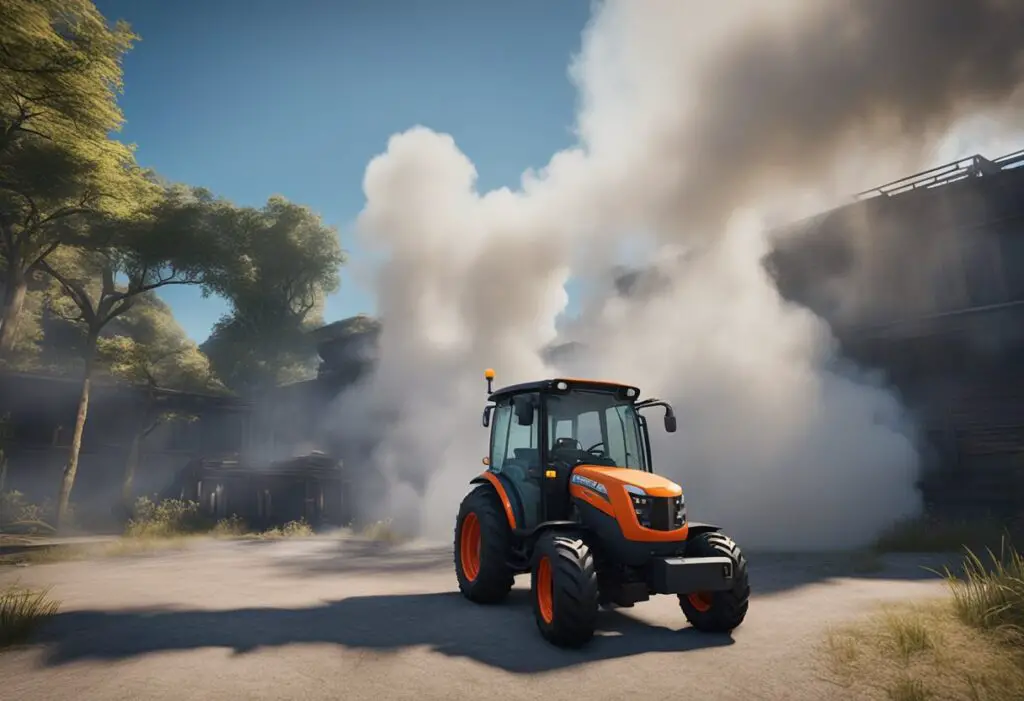
When you tackle the Regeneration System on the Kubota B3350, you’re dealing with the DPF handling, the complications that can arise during the regeneration process, and issues related to the sensors which monitor and control this system.
DPF Handling and Issues
Your Kubota B3350 is equipped with a Diesel Particulate Filter (DPF) to reduce emissions by trapping soot and exhaust particles. However, DPF problems can manifest when the filter becomes clogged, leading to frequent and sometimes unsuccessful regeneration attempts. Proper handling is crucial to maintain the system’s longevity.
- Keeping the DPF Clean: Ensure regular active regeneration cycles to prevent soot buildup.
- Understanding Warning Lights: The regen light on your dashboard will alert you when a regeneration cycle is needed.
Regeneration Process Complications
Regeneration is the process where the DPF burns off excess soot at high temperatures, a system your B3350 relies on for efficiency.
- Types of Regeneration:
- Active Regeneration: Automatically initiated while the tractor is in use.
- Passive Regeneration: Occurs naturally when the exhaust system reaches optimal temperatures.
If you’re facing regeneration problems, such as the system failing to complete its cycle, it could be due to faulty software or system malfunction during colder months.
Sensor Malfunctions and Indicators
Sensors are the eyes and ears of your regeneration system, constantly monitoring conditions to ensure the DPF is functioning correctly.
Here’s what you should keep an eye on:
- Sensor Health:
- Check the integrity of the sensors periodically to prevent false DPF warnings.
- Be aware of any irregularity in the regeneration indicators, which can be a sign of sensor malfunctions.
Remember that if your regeneration system is encountering frequent issues, it requires timely attention to prevent lasting damage to your tractor’s overall health.
Maintenance and Longevity
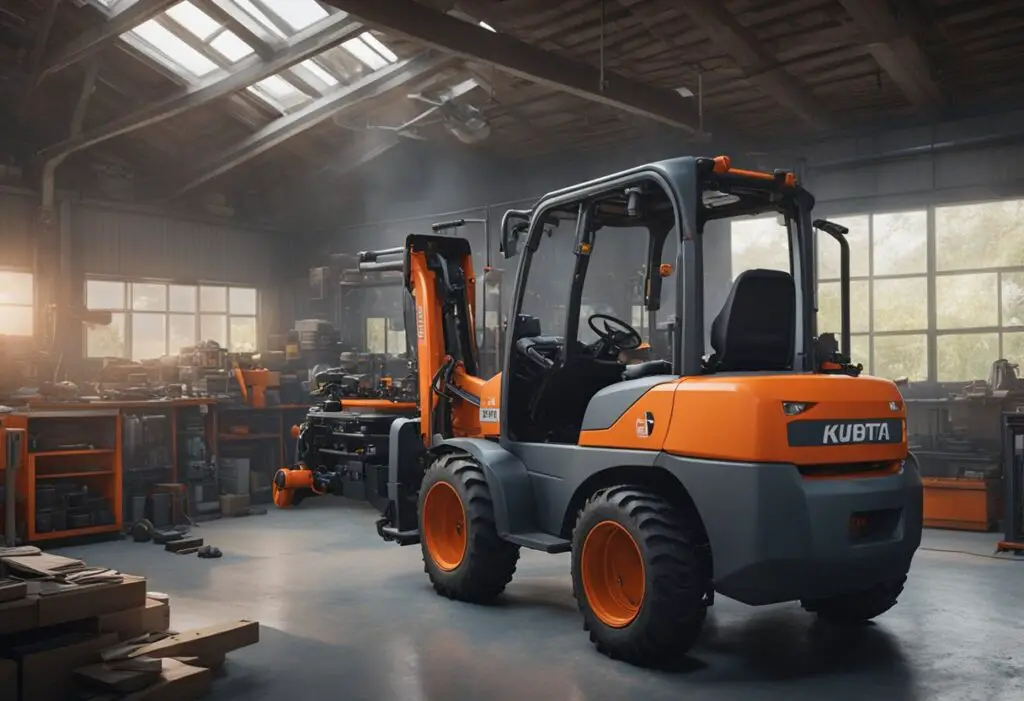
To ensure your Kubota B3350 tractor remains reliable throughout its lifespan, incorporating regular maintenance is essential. This approach not only mitigates aging and wear but also preserves the tractor’s durability and longevity.
Routine Check-ups
You should perform routine check-ups according to the manufacturer’s schedule. This typically involves:
- Engine Oil Check: Monthly, check and change the oil to prevent engine problems.
- Air Filter Inspection: Inspect and clean or replace the air filter to ensure optimal engine performance.
- Fuel System: Regularly check for any fuel system leaks and ensure your fuel quality is maintained to avoid poor fuel economy.
Consistency in these check-ups is key in preventing unexpected breakdowns and maintaining the efficiency of your tractor.
Preventive Measures
Taking preventive measures can substantially extend the reliability of your tractor. Here’s what you can do:
- Software Updates: Keep your tractor’s software up to date to avoid glitches that could impair its performance.
- Proper Operation: Use your tractor correctly following Kubota’s guidelines to prevent premature wear.
- Cleanliness: Keep your tractor clean, especially after tasks, to prevent buildup that could cause damage over time.
Wear and Tear
As the Kubota B3350 ages, you’ll start to notice signs of wear and tear, which are natural but can be slowed. To tackle these:
- Inspect and Replace Belts: Regularly check belt tensions and conditions; replace belts if signs of wear appear.
- Check for Leaks: Inspect hydraulic hoses and fittings regularly for leaks to preserve system integrity.
- Replacement Parts: Use quality, genuine replacement parts when necessary to maintain the tractor’s longevity and ensure it continues to perform at its best.
Proactive maintenance can greatly reduce the detrimental effects of wear and tear, thus safeguarding your Kubota B3350’s longevity.
Operational Challenges
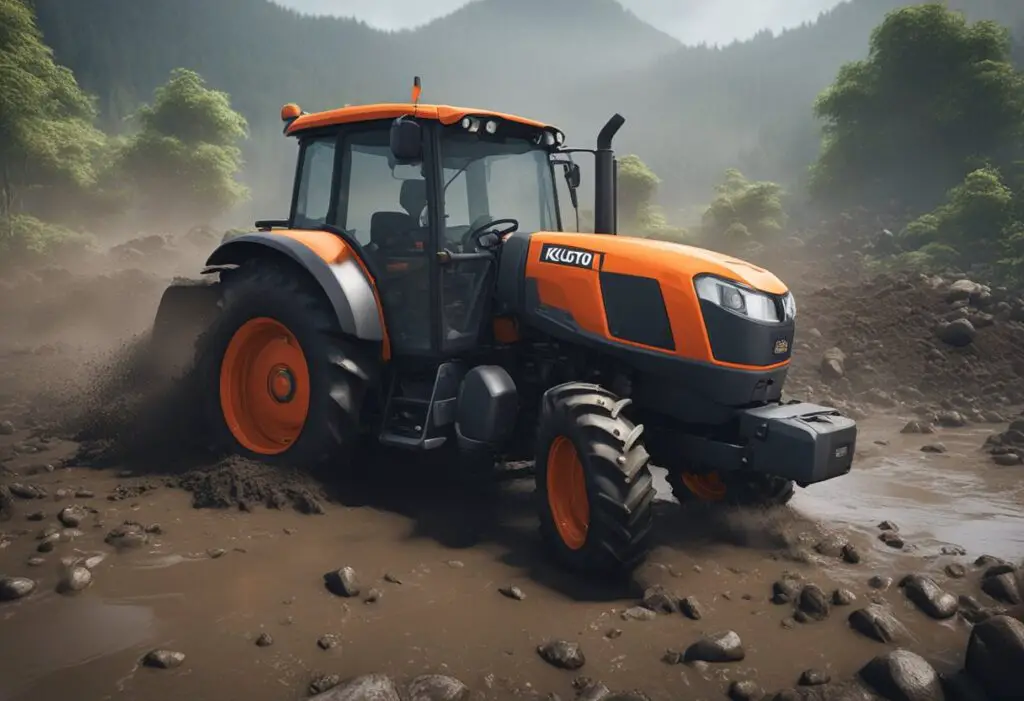
When you’re using your Kubota B3350 tractor, you might encounter some operational challenges that could affect your work efficiency. Understanding these potential issues can help you better prepare and address them if they arise.
Handling and Maneuverability
Your Kubota B3350 tractor should normally handle tasks with precision and ease. However, if you’re experiencing reduced handling or maneuverability, it could stem from a number of factors. Check your tractor’s four-wheel drive to ensure it’s engaging properly, as this can significantly affect steering and control. Regular maintenance of the tractor’s mechanical systems can help prevent these issues and ensure smoother operation.
Performance on Uneven Terrain
Working on uneven terrain can test the limits of your tractor’s performance. The B3350 is designed to maintain operation in various conditions, but you may notice a drop in performance when hauling heavy loads or dealing with steep grades. To mitigate poor performance, make sure the tire pressure is correct for the ground conditions you’re covering; this will provide better traction and stability. Additionally, be aware of the load weight you’re transporting to avoid overburdening your tractor, which can lead to reduced efficiency and potential mechanical problems.
Specific Part Issues
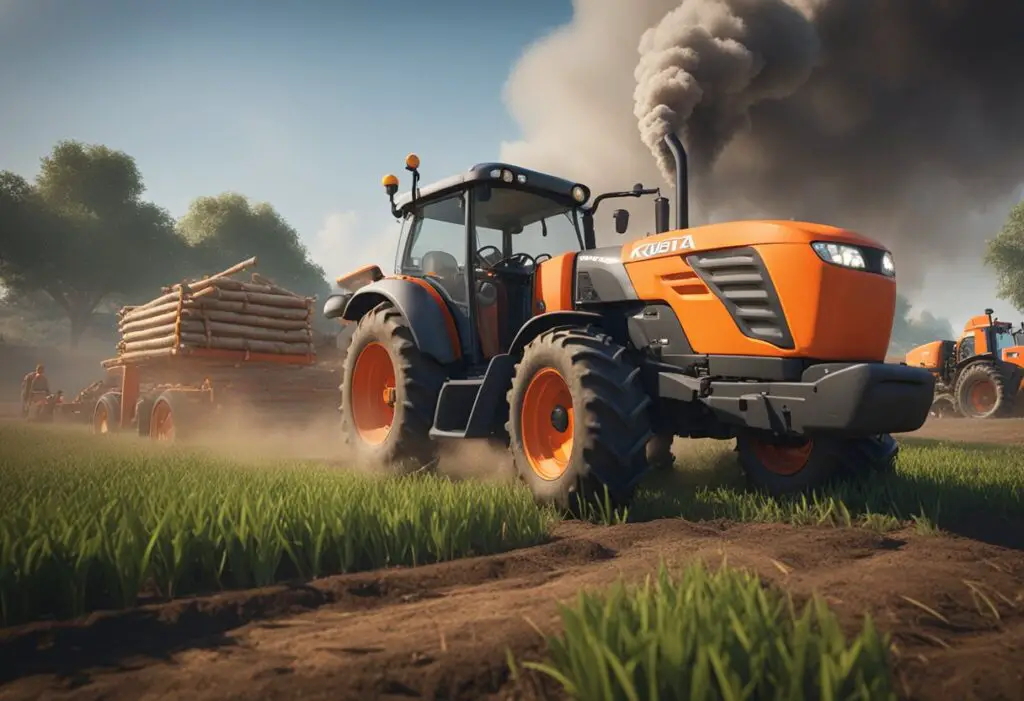
While maintaining your Kubota B3350, you might encounter problems that are specifically related to certain parts of the tractor. Let’s zoom in on some of these troublemakers to keep your machine running smoothly.
Battery and Starter Motor Concerns
Your Kubota B3350 relies on a strong battery and a robust starter motor for a prompt start. If you find your tractor struggling to turn on, the battery might be damaged, especially if left unused for extended periods. It’s crucial to check the battery’s charge regularly and keep connections clean. Furthermore, a faulty starter motor can result in similar starting issues. Signs of a starter problem include a clicking sound when trying to start the engine or no response at all.
Hydraulic Leaks and Seals
A common issue you may come across involves hydraulic leaks. These can occur due to worn-out seals or cracked hoses. Regularly inspect your tractor for any signs of hydraulic fluid leakage and pay attention to the performance of the hydraulics; sluggish or uneven lifting could indicate a problem. Replace any damaged seals and hoses promptly to maintain the hydraulic system’s integrity.
Blade and Cutting Quality
Maintaining optimal cut quality depends significantly on the condition of your tractor’s blades. Dull or damaged blades can leave you with a poor cut. Ensure the blades are sharp for a clean cut and to prevent strain on the tractor’s engine. If you notice an inconsistency in the cutting quality, it’s time to inspect the blades and replace them if necessary.
Accessory and Attachment Difficulties
When you’re working with your Kubota B3350, accessory and attachment issues can arise, mainly involving gear operation or how the tractor interacts with various attachments. Understanding these complications can help you maintain your tractor’s functionality and performance.
Gear and Power Take-off Complications
Your B3350’s gear synchronization is crucial for smooth operation, especially when shifting between tasks. If you encounter difficulty shifting gears, it could be due to misalignment or wear and tear from heavy usage. For the power take-off (PTO), which powers your tractor’s attachments, issues might occur if the PTO shaft is not correctly engaged or if there’s a malfunction in the gear mechanism.
- Check gear alignment & lubrication
- Ensure PTO shaft engagement & inspect for damage
Tire and Pressure Adjustments
Proper tire pressure on your Kubota B3350 is essential for optimal traction and fuel efficiency. You may notice a decrease in performance or an increase in soil compaction if your tire pressure is not at the recommended level.
Tire Pressure Checklist:
- Front tires: 18-22 PSI for regular work conditions
- Rear tires: 14-17 PSI for better grip during heavy-duty work
Customer Support and Warranty
Navigating the intricacies of warranty coverage and dealer support is much easier when you understand what is available to you as a Kubota B3350 owner. Below is a breakdown of the Kubota dealer services and warranty information you should be familiar with.
Kubota Dealer Services
When you experience issues with your Kubota B3350, your first point of contact should be an authorized Kubota dealer. They’re not only equipped to diagnose and resolve your tractor issues but are also the avenue for processing warranty claims. You’ll be expected to provide the proof of purchase and a detailed account of the issue at hand when seeking assistance. The dealer network is extensive, so you can usually find one that’s relatively local to you.
Warranty Information
Kubota offers a Limited Warranty for the B3350, which typically covers specific parts and labor for a predetermined period or usage limit. Be sure to understand the terms, as some components may be under a different warranty length than others. For instance, the emission control system might be protected for a longer period under a separate warranty. If you find yourself outside the standard warranty, look into Kubota’s lifetime warranty, which may cover parts like the DPF (Diesel Particulate Filter) and related sensors. Always review your warranty documents as there can be changes or updates to the coverage.
Fuel and Oil Management
When it comes to your Kubota B3350, maintaining optimal fuel and oil levels is crucial. Managing fuel consumption and efficiency, selecting the right oil types for changes, and understanding the role of additives will help keep your tractor performing at its best.
Fuel Consumption and Efficiency
Your B3350’s fuel efficiency is vital for operational cost-effectiveness. To monitor and improve your tractor’s fuel consumption:
- Check your fuel filter: Ensure it’s clean and unclogged to prevent fuel system issues.
- Monitor driving habits: Consistent speeds and proper gear use can reduce unnecessary fuel burn.
Oil Types and Changes
Choosing the correct oil type and regular oil changes are essential for preventing oil leaks and ensuring longevity of your tractor’s engine. Here’s what you should do:
- Select the right oil: Use the manufacturer-recommended oil type for your B3350 to avoid any compatibility issues.
- Change oil regularly: Follow the service interval specified in your owner’s manual to prevent the buildup of contaminants that could lead to oil leaks.
Fuel and Oil Additives
Additives can enhance your tractor’s performance, but they must be used properly:
- Fuel additives: Can help keep your fuel system clean, but ensure they’re compatible with your B3350’s engine.
- Oil additives: Some can reduce wear and oil leaks, but it’s crucial to choose ones that won’t affect the engine’s operation.
Environmental and Operational Factors
When operating your Kubota B3350 tractor, it’s important to consider how environmental factors and your usage patterns could lead to potential issues. Specifically, short distance operations and the effects of temperature and weather can impact the tractor’s performance and health.
Short Distance Operations
Your Kubota B3350 is designed to perform optimally in varying operational conditions, but running it for short distances can be hard on the engine. Frequent short uses prevent the tractor from reaching the optimal operating temperatures, which can lead to incomplete combustion. This can cause a buildup of unburned fuel, potentially resulting in:
- Overheating: The engine struggles to maintain its temperature, which might overload the cooling system.
- Increased engine wear: Operating in a consistently cool state can accelerate wear on engine components.
Temperature and Weather Impact
Temperature fluctuations and harsh weather conditions can also influence your tractor’s performance. Here’s how:
- Overheating: Intense heat can strain your B3350’s cooling system, especially if it’s not adequately maintained.
- Suboptimal Operation: In cold weather, your tractor might face challenges to reach and maintain the right operational temperatures, affecting fuel efficiency and engine performance.
Proper maintenance and understanding the environmental demands on your Kubota B3350 can help mitigate these factors.
Additional Concerns
In taking care of your Kubota B3350, you might encounter issues that go beyond the most common problems. It’s important for you to be aware of the lifespan of certain components and issues that can arise with essential systems.
Sensor and Electrical Component Lifespan
Your Kubota B3350’s sensors and electrical components are crucial for its operation, but they have a finite lifespan. You may notice electrical problems or a loss of power that could be attributed to these parts wearing out or faulty wiring. Regularly check the connections and watch for corrosion or damage in the wires. This can help prevent unexpected downtimes or failures.
Carburetor and Ignition System Issues
A well-functioning carburetor is vital for your tractor’s performance. If you’re experiencing power issues or if your tractor is running rough, it could be due to a dirty or malfunctioning carburetor. Likewise, problems with the ignition system can lead to difficulty starting the tractor or cause sudden power loss. Regular maintenance such as cleaning the carburetor and checking the ignition components can save you from these troubles.
Enhancements and Modifications
In tackling common issues with the Kubota B3350, you might consider specific enhancements and modifications aimed at improving your tractor’s performance and reliability.
DPF System Deletion
The Diesel Particulate Filter (DPF) can be a source of several problems such as regeneration issues with your B3350. You have the option to remove the DPF system entirely using a DPF delete kit. Keep in mind:
- Legality: Ensure that deleting the DPF complies with your local regulations, as it can be illegal in some areas.
- Installation: Professional installation is recommended due to the complexity of the system.
Engine Tuning and Upgrades
Improving engine performance can result in a more efficient and robust tractor. Consider these points:
- Diesel Tuners: Devices that modify the engine’s electronic controls to increase power and efficiency.
- Engine Maintenance: Using a DPF cleaning additive can help maintain the DPF system, if deletion isn’t your choice.
- Regular Upgrades: Keeping the engine updated with the latest parts and software patches can mitigate some electronic issues you might face.
Agricultural Task Efficiency
When operating your Kubota B3350, achieving efficiency in various agricultural tasks is vital for optimal performance.
Optimizing for Various Farming Tasks
Tilling: To maximize the B3350’s proficiency in tilling, ensure regular maintenance of the tiller attachment and adjust the depth settings according to your soil consistency.
Mowing: Keep your mower’s blades sharp. A clean cut is crucial, so consider blade sharpening a routine task to maintain mowing efficiency.
Loading: For loading tasks, balance the load evenly. Familiarize yourself with the loader control to operate it smoothly and prevent any unnecessary strain on the machine.
Hauling: Maintain tire pressure at ideal levels for hauling to prevent excessive wear and potential loss of power or fuel efficiency.
Adjusting these elements can lead to an optimized performance of your Kubota B3350 for the various farming tasks you undertake. It’s about fine-tuning your tractor to the specific demands of your agricultural workload.
Practical Tips for Users
Keeping your Kubota B3350 in optimal working condition relies on two key practices: consistent maintenance and knowing how to identify and address issues effectively.
Regular Inspections and Maintenance
Perform Regular Inspections:
- Check Air Filters: A clogged air filter can reduce efficiency. Clean or replace your air filters regularly to prevent engine strain.
- Inspect Gaskets: Look for signs of wear and tear on gaskets to prevent leaks and protect the engine.
Establish Routine Maintenance:
- Service Filters: Change clogged filters, including fuel and hydraulic filters, to prevent contamination that can affect performance.
- Sharpen and Replace Blades: Ensure your cutting jobs are smooth and efficient by keeping blades sharp. Dull blades can result in a poor cut quality and strain the tractor’s engine.
Effective Troubleshooting Methods
Transmission and Hydraulic System:
- If you’re experiencing slipping or other transmission problems, check the hydraulic system’s fluid level and quality. Low or contaminated fluid can lead to transmission issues.
Electrical System Troubleshooting:
- For electrical issues, start by inspecting the battery connections. Make sure they’re tight and free from corrosion.
Using these approaches, you can maintain the reliability of your Kubota B3350 and reduce the downtime due to unexpected malfunctions. Remember, consistent attention to these details can save you time and money in the long run.
Frequently Asked Questions
Navigating through common issues with your Kubota B3350 tractor can be smoother with quick access to reliable information. Below are succinct answers to help you address some typical concerns.
What are some common issues faced by Kubota B3350 owners?
Your Kubota B3350 might encounter several issues like poor fuel economy, oil leaks, electrical problems, or performance dilemmas related to its software or engine components.
How do I troubleshoot a starting problem on my Kubota B3350?
Check the battery and ensure it’s properly charged if your tractor won’t start. A clean fuel system is also crucial, so make sure to inspect the fuel filter for any clogging.
What should I check if my Kubota B3350 is overheating?
If your Kubota B3350 is overheating, inspect the coolant level and the radiator’s condition. Also, verify that the air intake is unobstructed and the engine components are clean.
Are there any particular maintenance tips for avoiding performance problems with a Kubota B3350?
Routine checks and maintenance, such as regularly inspecting the fuel filter, oil levels, and keeping the air filter clean, are essential for avoiding performance problems.
Has there been any recalls for the Kubota B3350 that I should be aware of?
Stay informed about the latest recalls by checking with your local Kubota dealer or visiting their official website for announcements on the B3350 model.
What are some fixes for hydraulic issues in a Kubota B3350?
Hydraulic issues in your B3350 might include slow operation or leaks. Double-check the hydraulic fluid level and look for any signs of leaks, ensuring connections are tight.
Leave a Reply